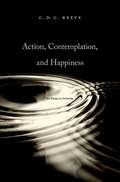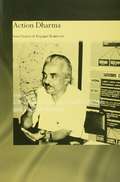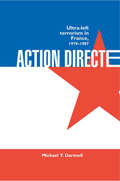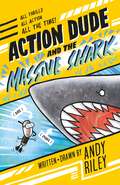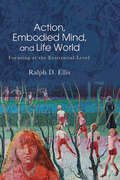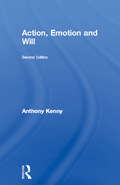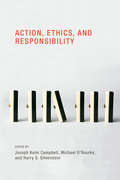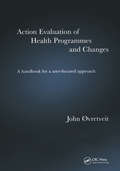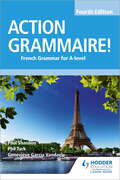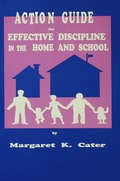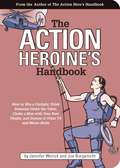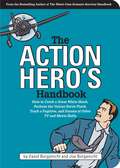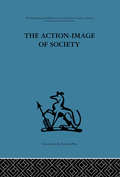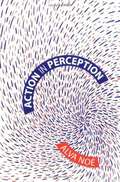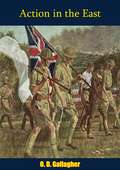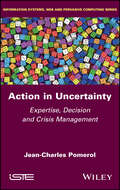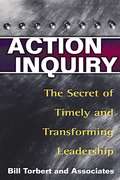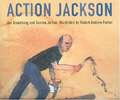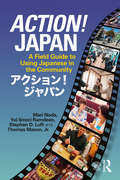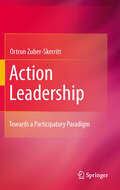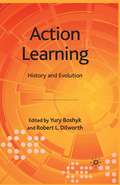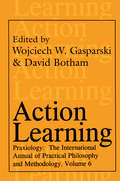- Table View
- List View
Action, Contemplation and Happiness: An Essay on Aristotle
by Reeve C. D. C.The notion of practical wisdom is one of Aristotles greatest inventions. It has inspired philosophers as diverse as Martin Heidegger, Hans-Georg Gadamer, Elizabeth Anscombe, Michael Thompson, and John McDowell. Now a leading scholar of ancient philosophy offers a challenge to received accounts of practical wisdom by situating it in the larger context of Aristotles views on knowledge and reality. That happiness is the end pursued by practical wisdom is commonly agreed. What is disputed is whether happiness is to be found in the practical life of political action, in which we exhibit courage, temperance, and other virtues of character, or in the contemplative life, where theoretical wisdom is the essential virtue. C. D. C. Reeve argues that the dichotomy is bogus, that these lives are in fact parts of a single life, which is the best human one. In support of this view, he develops innovative accounts of many of the central notions in Aristotles metaphysics, epistemology, and psychology, including matter and form, scientific knowledge, dialectic, educatedness, perception, understanding, political science, practical truth, deliberation, and deliberate choice. These accounts are based directly on freshly translated passages from many of Aristotles writings. "Action, Contemplation, and Happiness" is an accessible essay not just on practical wisdom but on Aristotles philosophy as a whole.
Action, Contemplation, and Happiness: An Essay On Aristotle
by C. D. ReeveThis accessible and innovative essay on Aristotle, based on fresh translations of a wide selection of his writings, challenges received interpretations of his accounts of practical wisdom, action, and contemplation and of their places in the happiest human life.
Action Dharma: New Studies in Engaged Buddhism (Routledge Critical Studies In Buddhism Ser. #Vol. 23)
by Christopher QueenAction Dharma charts the emergence of a new chapter in an ancient faith - the rise of social service and political activism in Buddhist Asia and the West. Fourteen new essays treat the historical origins, global range, teachings and practices, and leaders and organizations that make up the latest turning of the Dharma. Environmentalism and peace wa
Action Directe: Ultra Left Terrorism in France 1979-1987
by Michael Y. DartnellIn defining Action Directe's mixture of millenarianism, workerism and nihilism, this study explains why the group turned to a strategy of murderous strikes and how a revolutionary political faction emerged in a stable western society.
Action Dude and the Massive Shark: Book 3 (Action Dude #3)
by Andy RileyFirst name . . . Action. Second name . . . Dude. Get ready for his third adventure!So don't panic... I won't say it. People might get scared. I'd better not mention there's a HUGE DEADLY MUTANT SHARK on the loose... whoops!Luckily Action Dude is on hand to help.Third in a full-colour graphic novel series about an incredible action hero who is also a nine-year-old boy.
Action, Embodied Mind, and Life World: Focusing at the Existential Level (SUNY series in American Philosophy and Cultural Thought)
by Ralph D. EllisAction, Embodied Mind, and Life World combines embodied consciousness research, existential phenomenology, Gendlin's "focusing" concept, and recent self-organizational work on basic emotions (e.g., Panksepp, Frijda), to explore the way patterns of motivated action shape our interpretations of reality—personally, biologically, and within a sociopolitical community. Like a bat projecting sonar, we understand our world by sensing patterns of resistance against our own self-initiated actions. If hammering is the action, we find "nails" and "non-nails." Actions in turn express a self-organizing process rooted in motivational structures that presuppose values. These patterns of motivation therefore prefigure the shape of what we think or perceive. But the emotions, feelings, "sensings" through which we discern motivation are never just about what they seem, especially given ample incentives to distortion and self-deception. The "trigger" is the tip of an iceberg. This book works toward a coherent method for getting at the basement level of the action trajectories that motivate exploration, selective attention, and thus interpretations of reality—a crucial question in an age of motivated disinformation.
Action, Emotion and Will: 1963 Edition
by Anthony Kenny Dr Anthony KennyAction, Emotion and Will was first published in 1963, when it was one of the first books to provoke serious interest in the emotions and philosophy of human action. Almost forty years on, Anthony Kenny's account of action and emotion is still essential reading for anyone interested in these topics.The first part of the book takes an historical look at the emotions in the work of Descartes, Locke and particularly Hume. In the second part, Kenny moves on to discuss some of the experimental work on the emotions by 20th Century psychologists like William James. Separate chapters cover feelings, motives, desire and pleasure. This edition features a brand new preface by the author.
Action, Ethics, and Responsibility (Topics in Contemporary Philosophy)
by Joseph Keim Campbell Michael O'Rourke Harry S. SilversteinLeading philosophers explore responsibility from a variety of perspectives, including metaphysics, action theory, and philosophy of law.Most philosophical explorations of responsibility discuss the topic solely in terms of metaphysics and the "free will" problem. By contrast, these essays by leading philosophers view responsibility from a variety of perspectives—metaphysics, ethics, action theory, and the philosophy of law. After a broad, framing introduction by the volume's editors, the contributors consider such subjects as responsibility as it relates to the "free will" problem; the relation between responsibility and knowledge or ignorance; the relation between causal and moral responsibility; the difference, if any, between responsibility for actions and responsibility for omissions; the metaphysical requirements for making sense of "collective" responsibility; and the relation between moral and legal responsibility. The contributors include such distinguished authors as Alfred R. Mele, John Martin Fischer, George Sher, and Frances Kamm, as well as important rising scholars. Taken together, the essays in Action, Ethics, and Responsibility offer a breadth of perspectives that is unmatched by other treatments of the topic.ContributorsJoseph Keim Campbell, David Chan, Randolph Clarke, E.J. Coffman, John Martin Fischer, Helen Frowe, Todd Jones, Frances Kamm, Antti Kauppinen, Alfred R. Mele, Michael O'Rourke, Paul Russell, Robert F. Schopp, George Sher, Harry S. Silverstein, Saul Smilansky, Donald Smith, Charles T. Wolfe
Action Evaluation of Health Programmes and Changes: A Handbook for a User-Focused Approach
by John ØvretveitHealthcare Performance and Organisational Culture examines the evidence for a relationship between organisational culture and organisational performance in the health care sector. This book provides essential information to assist health managers improve the performance of their organisation by addressing the factors of style and culture, using practical tools throughout to measure them and link them to performance. It comprehensively examines the theoretical basis of the relationship between organisational culture and performance and assesses the various tools designed to measure or assess the culture of organisations. All healthcare professionals and clinicians with management responsibilities will find this book essential reading.
Action for the Environment: Clean Air
by Rufus BellamyAction for the Environment. All around the world today, people are taking Action for the Environment. From small, local projects to large, global initiatives, people are finding ways to help prevent environmental damage. This new series helps build a foundation for a sustainable future by looking at: THE KEY ENVIRONMENTAL ISSUES, SOLUTIONS TO THE PROBLEMS, WHAT WE CAN DO TO HELP. Other titles in the series: Garbage Disposal, Water Supplies, Saving Wildlife, Energy Supplies, Transportation Solutions, Protecting Habitats, Food for All.
Action Grammaire! Fourth Edition: French Grammar for A Level
by Paul Shannon Phil Turk Geneviève García VandaeleExam board: AQA, Edexcel, OCR, WJEC/EduqasLevel: A-levelSubject: FrenchFirst teaching: September 2016First exams: Summer 2017 (AS) Summer 2018 (A-level)Make French grammar second nature with this trusted reference book containing over 300 activities - now completely revised in line with the new A-level specifications. - Supplement key resources in class or encourage independent practice at home, with clear explanations of the grammar points needed at A-level and knowledge-check exercises throughout - Prepare for assessment with longer application activities focused on developing writing skills such as translation and summary - Build confidence as exercises get increasingly more challenging to mirror students' advancement throughout the course - Check students' progress with regular grammar tests and all answers supplied online
Action Grammaire! Fourth Edition: French Grammar for A Level
by Phil Turk Geneviève García Vandaele Paul ShannonExam board: AQA, Edexcel, OCR, WJEC/EduqasLevel: A-levelSubject: FrenchFirst teaching: September 2016First exams: Summer 2017 (AS) Summer 2018 (A-level)Make French grammar second nature with this trusted reference book containing over 300 activities - now completely revised in line with the new A-level specifications. - Supplement key resources in class or encourage independent practice at home, with clear explanations of the grammar points needed at A-level and knowledge-check exercises throughout - Prepare for assessment with longer application activities focused on developing writing skills such as translation and summary - Build confidence as exercises get increasingly more challenging to mirror students' advancement throughout the course - Check students' progress with regular grammar tests and all answers supplied online
Action Guide For Effective Discipline In The Home And School
by Margaret K. CaterFirst published in 1992. This Action Guide is for individual or group study of the book Effective Discipline in the Home and School by Genevieve Painter and Ray Corsini. This book assists parents, teachers, and counselors in training children so that home and school will be happy and efficient, organized but pleasant -- with adults satisfied with their children and children growing up to be respectful, responsible, and resourceful. It provides solutions and emphasizes practicality.
The Action Heroine's Handbook: How to Win a Catfight, Drink Someone Under the Table, Choke a Man with Your Bare Thighs, and Dozens of Other TV and Movie Skills
by Joe Borgenicht Jennifer WorickGet Some Action! For every woman who wants to be as tough as Lara Croft, as nimble as the Bionic Woman, and as babe-a-licious as Charlie's Angels, The Action Heroine's Handbook shows you the essential skills you'll need to conquer the bad guys and save the day without breaking a sweat. Find out how the real action heroines do it, directly from a host of experts, including stuntwomen, jujitsu instructors, helicopter pilots, detectives, forensic psychologists, survivalists, primatologists, and many others. Learn to: * Profile a serial killer * Outwit a band of home intruders * Navigate white water rapids * Go undercover as a beauty queen * Outrun a fireball, and dozens of other Tough Chick Skills, Beauty Skills, Brain Skills, Brawn Skills, and Escape Skills. Special sections and appendices feature the top action heroine hairdos, handbag essentials, and the best footwear for every action situation. With step-by-step instructions and easy-to-follow illustrations, The Action Heroine's Handbook will prepare you to save the world, one baddie at a time.
The Action Hero's Handbook: How to Catch a Great White Shark, Perform the Vulcan Nerve Pinch, and Dozens of Other TV and Movie Skills
by David Borgenicht Joe BorgenichtThe Ultimate Guide to Keeping Up with the Indiana Joneses For everyone who's ever wanted to be as smooth as James Bond, as clever as Captain Kirk, or as tough as Charlie's Angels, The Action Hero's Handbook is the ultimate guide to the essential skills every action hero needs to survive and thrive in this dangerous but exciting world. This book features dozens of real-life action hero techniques, directly from experts in the subjects at hand: FBI agents, sexologists, stuntmen, hypnotists, karate masters, criminologists, detectives, and many others. Learn how to: * Catch a great white shark * Deliver the Vulcan Nerve Pinch * Spyproof your hotel room * Win a fight when outnumbered * Climb down Mount Rushmore National Monument And dozens of other Good Guy Skills, Paranormal Skills, Fighting Skills, and Escape Skills. With meticulously researched step-by-step instructions and easy-to-follow illustrations, The Action Hero's Handbook will get you ready for anything. Good luck--we're all counting on you. From the Trade Paperback edition.
The Action-Image of Society on Cultural Politicization
by Alfred WillenerTavistock Press was established as a co-operative venture between the Tavistock Institute and Routledge & Kegan Paul (RKP) in the 1950s to produce a series of major contributions across the social sciences. This volume is part of a 2001 reissue of a selection of those important works which have since gone out of print, or are difficult to locate. Published by Routledge, 112 volumes in total are being brought together under the name The International Behavioural and Social Sciences Library: Classics from the Tavistock Press. Reproduced here in facsimile, this volume was originally published in 1970 and is available individually. The collection is also available in a number of themed mini-sets of between 5 and 13 volumes, or as a complete collection.
Action in Perception
by Alva Noë"Perception is not something that happens to us, or in us," writes Alva Noë. "It is something we do." In Action in Perception, Noë argues that perception and perceptual consciousness depend on capacities for action and thought -- that perception is a kind of thoughtful activity. Touch, not vision, should be our model for perception. Perception is not a process in the brain, but a kind of skillful activity of the body as a whole. We enact our perceptual experience.
Action in the East
by O. D. GallagherThis book, first published during WWII in 1942, is reporter O'Dowd Gallagher's account of nine eventful months in southeastern Asia. During his stay in Singapore, the Japanese bought to fruition their carefully conceived plan for striking simultaneously at Pearl Harbor, Malaya, Hong Kong, the Philippines, and the Netherlands Indies.An absorbing first-hand record of the brutal opening phases of the Second World War in the Far East.
Action in Uncertainty: Expertise, Decision and Crisis Management
by Jean-Charles PomerolDespite uncertainty, people are born to act. Faced with environmental aggression and upheaval, inaction is more stressful than action. What choices, strategies or methods need to be implemented so that action is as effective as possible in terms of the objectives to be achieved? We should not delude ourselves about the term "good decision", which does not have much meaning when we act in an uncertain environment and when we know the weakness of forecasts. However, we must know how to act and be capable of taking the most appropriate action. Action in Uncertainty is a real guide to taking effective action when nothing is certain. According to the different types of uncertainty, what are the respective good uses of expertise and intuition? How do we motivate teams and avoid cognitive bias and manipulation? These themes are dealt with in clear and accessible terms to help decision-makers make the right choices in a world that is more uncertain than ever.
Action Inquiry: The Secret of Timely and Transforming Leadership
by Bill TorbertAction inquiry is an approach to learning leadership in the midst of action. Torbert (management, Boston College) leads readers through strategies that lead readers to practice action inquiry continually. Speaking to everyone from new managers to CEOs and world leaders, he offers real-life stories of leadership and organizational transformations to show how action inquiry increases personal integrity, company profitability, and long-term organizational and environmental sustainability. Annotation ©2004 Book News, Inc. , Portland, OR (booknews. com)
Action Jackson
by Jan Greenberg Sandra JordanOne late spring morning the American artist Jackson Pollock began work on the canvas that would ultimately come to be known as Number 1, 1950 ("Lavender Mist"). Award-winning authors Jan Greenberg and Sandra Jordan use this moment as the departure point for a unique picture book about a great painter and the way in which he worked. Their lyrical text, drawn from Pollock's own comments and those made by members of his immediate circle, is perfectly complemented by vibrant watercolors by Robert Andrew Parker that honor his spirit of the artist without imitating his paintings. A photographic reproduction of the finished painting, a short biography, a bibliography, and a detailed list of notes and sources that are fascinating reading in their own right make this an authoritative as well as beautiful book for readers of all ages.<P><P> Winner of the Sibert Honor
Action! Japan: A Field Guide to Using Japanese in the Community
by Mari Noda Yui Iimori Ramdeen Stephen D. Luft Thomas Mason, Jr.Action! Japan is a practical guide for intermediate to advanced students of Japanese wanting to maximize their study abroad experience and enhance their language skills. This handy guide contains over 100 Field Performance tasks which prompt real-life interactions with native speakers. By carrying out these real-life tasks students refine and solidify existing communication skills and gain a fuller understanding of and participation in Japanese culture. The guide also provides over 60 Performance Watch tasks which help students understand how native speakers accomplish communicative goals through guided observation and analysis of naturally occurring interactions. Action! Japan helps students understand and participate socially in Japanese, guiding them through skill-getting and skill-using processes and enabling them to form meaningful connections with Japanese people in the community.
Action Leadership: Towards a Participatory Paradigm (Professional and Practice-based Learning)
by Ortrun Zuber-SkerrittAction leadership is a creative, innovative, collaborative and self-developed way to lead. It eschews the hierarchical structure usually associated with leadership and is based instead on the democratic values of freedom, equality, inclusion and self-realization. It take responsibility for, not control over, people through networking and orchestrating human energy towards a holistic outcome that benefits the common interest. Action leaders are passionate people who abide by the motto that "Learning does not mean to fill a barrel but rather to ignite a flame" in others. And in this time of rapid economic, political, technological, social and ecological changes, action leadership and action leaders are precisely what's needed to improve how people and organizations engage constructively to address the myriad complex issues challenging society at all levels. Action Leadership: Towards a Participatory Paradigm explains and illustrates how action leadership can be developed through participatory action learning and action research (PALAR). It addresses real-life issues by people who choose to work collaboratively towards shared goals while developing their learning, insights, knowledge, people skills and personal relationships through involvement in a PALAR project. The book provides a conceptual framework for action leadership and for the integrative, practical theory of PALAR; and examples of applications in higher education, management education for organization development, and community development. Readers are encouraged to adopt, adapt and further develop the evolving concepts of action leadership and PALAR in a participatory paradigm of learning, research and development.
Action Learning: History and Evolution (The\professional Practices In Adult Education And Lifelong Learning Ser.)
by Yury Boshyk Robert L. DilworthThe first of a two volume set that fully explore the roots of action learning and the legacy of its principal pioneer, Reg Revans. Rather than prescribe one approach to action learning, it shows alternative approaches to fit different contexts, including classic action learning, action reflection learning and business driven action learning.
Action Learning: Praxiology (Praxiology Ser. #Vol. 6)
by Wojciech W. GasparskiPraxiology is the study of working and doing from the point of view of effectiveness. It has three components: analysis of concepts involving purposive actions; critique of modes of action from the viewpoint of efficiency; and normative advisory aspects in recommen-dations for increasing human efficacy. This sixth volume of the Praxiology series fo-cuses on action learning. Learning from distinguishable action is surprisingly different than learning from a sub-ject expert in human or book form. For those who have worked with and in action learn-ing, the latest form is always distinguishably different from a former experience. Action learning programs are not, in general, intended to tackle puzzles, namely, questions to which an answer may be said to exist even if that answer is difficult to find; action learn-ing is intended to help to develop the ability to tackle problems or opportunities, of which different persons, all experienced, intelligent, and motivated, might well advocate differ-ent courses of action, all reasonable. The essentials of action learning, according to this volume, are: there can be no learning unless the participant receives feedback about his/her performance; partici-pants learn only of their own volition and never at the will of others; the volition to learn is most readily engendered by the lure of success or by the fear of calamity. Building upon these essentials, the authors view action learning as a process of inquiry begin-ning with the experience of not knowing what to do next, and finding that an answer is not available from current expertise. All chapters in this volume are sound contributions to the continuing debate on the processes of learning from distinguishable action. Action Learning is intriguing reading for sociologists, philosophers, managers, and research-ers of all disciplines.
